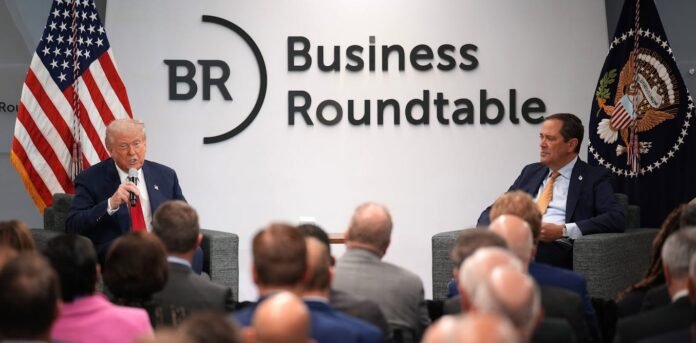In the first months of Donald Trump’s second term as president, his policies – from sweeping tariffs and aggressive immigration enforcement to attacks on diversity, equity and inclusion – have thrown U.S. businesses into turmoil, leading to a 26-point decline in CEO confidence.
Yet despite this volatility, many American corporations have remained notably restrained in their public responses.
This might come as a surprise. After all, in recent decades, CEOs have become increasingly willing to speak out about social and political issues. But while some universities and law firms have publicly pushed back against the Trump administration, business leaders are seemingly opting for caution.
What would it take for these titans of corporate America to speak out against Trump’s policies? We are a professor and a graduate student who study business, and back in 2018, one of us – Dr. Carmel – conducted an analysis asking this very question. More recently, we gathered new data looking at how business leaders are responding to Trump’s second term.
The 2018 analysis, involving data from about 200 leading U.S. CEOs, found that most business leaders remained publicly neutral on Trump, and only a handful expressed strong opposition. Silence was often a strategic choice, with many leaders staying mum due to fear of retaliation. The evidence also suggested that Trump could one day cross a line that would prompt a broader CEO backlash.
Seven years later, that line hasn’t yet appeared, even as Trump’s footprint on corporate America is now far more direct and substantial.
Most notable are Trump’s tariffs, first announced in April 2025, which have roiled global markets and unnerved CEOs. And there are many other ripples: Some companies, such as CBS’ parent company, Paramount – which is seeking the Trump administration’s approval for a merger – have decided to self-censor. Others, including Disney and Meta, gave in to Trump’s lawsuits and paid multimillion-dollar settlements, against the counsel of many outside experts. CEOs also have to deal with the threat of backlash from both the right and left.
Against this backdrop, we collected new public data to see how corporate leaders are responding to the second Trump administration. Just as in 2018, we examined the 232 companies that make up the Business Roundtable – a club of the most powerful American businesses.
We assessed the actions that these companies took regarding DEI and whether they experienced any backlash. We focused on these criteria as a way to assess whether CEOs are seeking either to support or placate Trump, or to stand on other principles. We also collected other data, including public statements from CEOs and campaign donations.
DEI as a bellwether
Corporate DEI actions were an early, useful way to gauge a business’s stances, since, from the outset, the Trump administration identified DEI as a “scourge” to be eliminated. Although the White House’s anti-DEI directives have applied to the executive branch and federal contractors, some private businesses rushed to make changes as well.
By May, just a bit over 100 days into Trump’s second term, a significant number of companies had decided to go along with Trump’s preferences. Sixty-nine of the 232 companies in the Business Roundtable rolled back their DEI initiatives in some way, while just 20 companies announced that they kept their DEI programs in place. There’s no information either way on the remaining 61% – likely because they decided it’s better to stay out of the news.
DEI-related actions have tapered off since May, but there’s still an impact. For example, the Federal Communications Commission pressured T-Mobile to eliminate DEI. Only then was its merger approved.
Companies that scaled back their DEI initiatives sometimes pointed to the political environment as a factor. Meta, for example, said in an internal memo that it was ending its DEI efforts due to a “shifting legal and policy landscape.” Other companies, including Verizon and Comcast, reportedly rolled back DEI programs because they feared legal action by the federal government.
Some corporations announced changes through internal announcements, legal filings or quiet updates to their websites, suggesting they want to stay out of the media spotlight.
A small number of Business Roundtable companies stood firm on their DEI policies – to mixed results. When Marriott’s CEO voiced support for DEI at a corporate leadership event, he reportedly received 40,000 appreciative emails from employees. On the other hand, after Coca-Cola reiterated its “commitment to sponsoring an inclusive workplace,” the right-wing activist Robby Starbuck — who The New York Times has described as “the anti-DEI agitator that companies fear most” – said Coca-Cola “should be very nervous about continuing with its woke policies.”
Bracing for backlash
Overall, 22% of Business Roundtable companies saw some sort of backlash to their actions. Most came from the political right: 36 companies were called out by conservatives, another eight by progressives, and eight more faced bipartisan backlash.
With more than three years left in Trump’s second term, it’s worth asking what lies ahead. We think the most likely scenario is that companies will continue to try to stay off the president’s radar and placate him when they must. After all, following the split with Elon Musk, Trump quite explicitly threatened to use presidential powers to hurt Musk’s businesses. Any CEO gets the implications.
While our analysis primarily focused on social issues, policies at the business core may push U.S. companies to confront Trump. Tariff policy is a prime example. Back in April, major retailers like Walmart quietly warned Trump that tariffs could lead to empty shelves and higher prices. More recently, the CEO of Goldman Sachs publicly warned that tariffs “have raised the level of uncertainty to a degree I do not think is healthy for investment and growth.”
These are voices of criticism – but worded quite softly.






